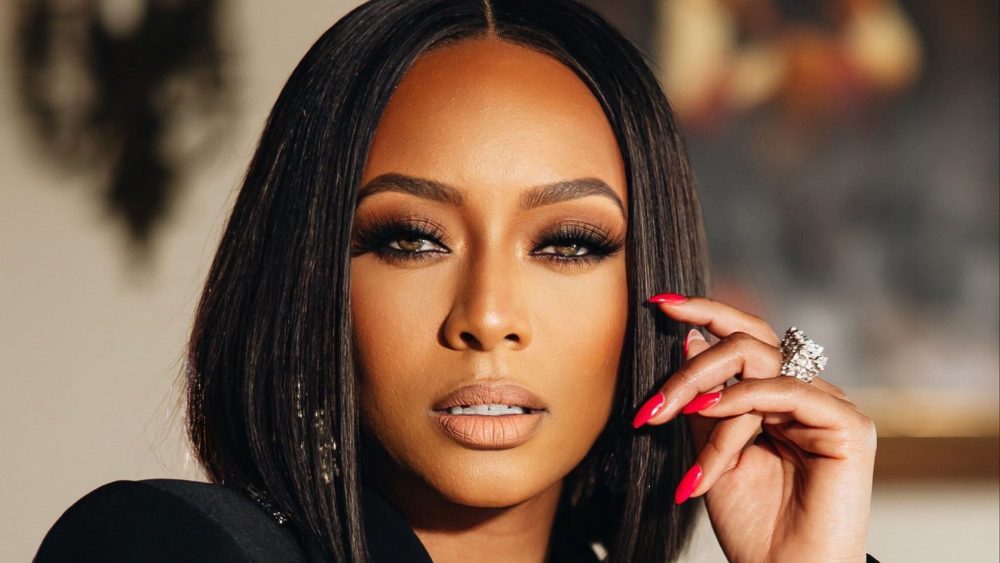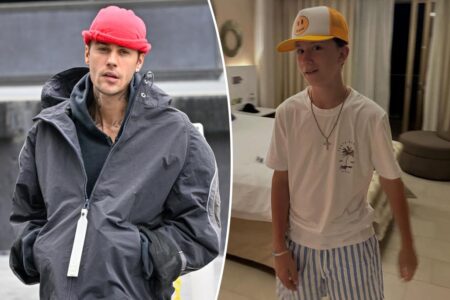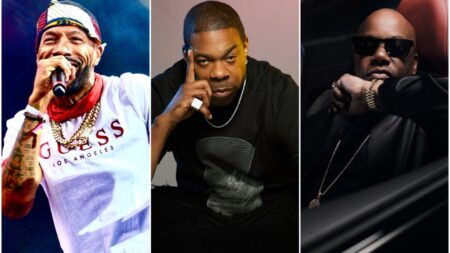Metaphors come easily to Keri Hilson. The singer-songwriter is seated at a table near the entrance to a Hollywood cafe just days before the first piece — or “scene,” as she calls it — of her third album “We Need to Talk” arrives. It’s the first body of work she’s released in 15 years, and she’s reflecting on the early days of her career, powered by a pair of R&B albums released at the end of the aughts. Just then, two teenage girls enter the coffee shop, flowers in hand to sell to patrons.
“Can we give you a rose?” asks one excitedly. “Sure!” responds Hilson. “Thank you. And it matches me. I love it.” “Miss Keri, baby!” adds the other girl, referencing the songwriter tag Hilson stamped on her formative songs.
Hilson takes a beat after they leave. “Fame is a surreal scenario,” she says, recentering her focus. Is she nostalgic for the past, when she was on a rocket ride to stardom, before she took an extensive hiatus? “Yeah. There was so much unfolding. Like the petals of this rose. It was a bud for real though, that’s how it feels. It was slowly unfurling and blossoming. I was blossoming in some beautiful ways. My dreams were coming true. It was like the first harvest.”
It’s been decades since Hilson punched into the music business, first as a songwriter with credits on hits like Britney Spears’ “Gimme More” and Pussycat Dolls’ “Wait a Minute,” before forging a successful solo career of her own. After debuting as a guest vocalist on songs like Timbaland’s “The Way I Are” and Xzibit’s “Hey Now (Mean Muggin),” she released her first album “In a Perfect World…” in 2009, producing two top 20 hits: “Turnin’ Me On” with Lil Wayne, and “Knock You Down” with Kanye West and Ne-Yo. Sophomore album “No Boys Allowed” came a year later, and with it the anthem “Pretty Girl Rock,” a certified hit that endures as a generational reinforcement of self-love.
Now, after an extended readjustment period, she’s finally come back to the table with “We Need to Talk,” a trilogy consisting of the first installment, “Love,” which dropped last Friday. She conceptualized the album with a more-is-more approach, free to release music as an independent artist after getting out of the contracts that kept her dormant.
“Literally the floodgates are open now, I can flood the market how I choose, and how I feel as though I want to,” she says, using air quotes to describe how she “gained” her freedom in 2022. “I wanted a sound that represented the sound of music I always wanted to make. It has a retro feel, just throwback essence, rawness. The arrangements, it was pretty intentional but also to keep it fresh, to make it sound new and not sound like something other people are doing. That’s important to me as an artist, always has been, to lead and not follow. So this for me is a project where I got to do that.”
For the album, she worked with musicians including Polow da Don, Danja, Ryan Leslie and DJ Camper, tracing a story that will be told in full in the coming months. She was inspired by artists like Silk Sonic, the retro project from Bruno Mars and Anderson.Paak, as well as classics from Stevie Wonder and Lauryn Hill. “We Need to Talk” was preceded by the bass-plucked single “Bae” and plays as a narrative-driven body of work reveling in the dawn of a new relationship. The double entendres are rife: “Naked (Love)” is as much about exposing yourself to a new love interest as it is about being truthful with her audience. “I just want to be naked / Showing my inside / It don’t much matter to me,” she sings on the sparse tune.
Hilson has been open about the long road to the record, sharing her struggles with depression and the effect it had on her creativity. Yet she’s vague about the minutiae of what kept her from releasing music, contemplating exactly how to explain what had happened. “I would word that like…,” she says, taking a long pause. “When you are contractually tied to players that were involved in the height of your success, it’s not easy for them to let go of you. That’s it. That’s how I would wrap that up.”
At the dawn of her career, she was signed in a joint venture between Polow’s Zone 4 and Timbaland’s Mosley Music, a partnership that was a confluence of two of music’s most prominent producers. With them, she crafted dozens of hits for both herself and other artists. Now, she insists her relationships with the two are still strong — “I’m cool with everybody honestly,” she says — but that the greater powers that be didn’t want to let her out from under their thumb.
Still, she looks back on that period as a blessing, not a curse. “The delays became a luxury in a sense for me,” she says. “I feel it’s a metaphor like it always is. If you understand life in a certain realistic way, then you realize that any and every time you were delayed on something you truly knew you were supposed to do and wanted to do and were designed to do, that delay was a gift. Some good came of it, there was a reason for it, there was a purpose in hindsight and you’re like, ‘Oh I see why that had to happen.’ I don’t know. Maybe I’m too much of a relentless optimist or something, but I can clearly see how it was actually good for me in a lot of ways.”
She embarked on her newest path with a six-part web series that featured her in a sort-of therapy session with another iteration of herself. In the first episode, she’s vulnerable about the hestancies that come with being back in the public eye: “Trauma, clickbait, headlines, the commentary, sleep deprivation. People are going to talk. Sure, that’s fine. But whenever I talk, now I get in trouble,” she tells her other self. “Actually, you get in trouble even when you don’t talk,” she responds.
That foresight once again materialized in the lead-up to “We Need to Talk” after Hilson gave an interview addressing a social media-fueled non-beef between her and Beyoncé. Hilson had taken vague potshots at her on a leaked remix of “Turnin’ Me On,” something she clarified she didn’t actually write, but consequently haunted her for years. It fulfilled the prophecy she addressed in the web series: whether you address the chatter or not, it’ll always come back in full force.
“It’s like on one hand you expect it, on the other hand, I’m just as disappointed and ready for it to be over, as the fans are,” says Hilson, taking a moment to think. “That’s all I got on that.”
Hilson is clearly focused on what’s next, not everything that preceded it. “We Need to Talk” is a recentering, a path forward, a reminder of the sharp pen she used to write classics that still has ink. On the record, her voice is as warm and precise as it’s ever been, with songs like the towering “Whatever” that accent the strengths of her earliest work in a contemporary context.
It’s perplexing to conceive that an artist at the height of her career would break from the industry she helped build for a decade and a half, yet here she is, bright-eyed as ever, embarking on the third chapter of her solo career when “it should be the fourth or fifth, right?” Hilson explains that the lane is open, and she’s eager to get back into the songwriting game, potentially for artists like Doechii and Lizzo. (She estimates she has hundreds of songs in various stages of completion.)
But for now, the focus is on expressing what she’s wanted to say for years, and doing it on her own terms. “I’m the one who’s always going to be in the trenches. Anyone else involved could have things going on. I’m all I have,” she says. “My brand, my voice, my music, my pen, my thoughts, my creativity, my inspiration, my vision. My body, my clothing… Literally, I’m not managing other artists. I don’t have my hands in a lot of pots. This is the pot I have. So me taking control of who I am and how I’m presented and what comes out of my mouth and what is released and what doesn’t get released, I deserve as a woman now to have my control. The career is me.”
Read the full article here








